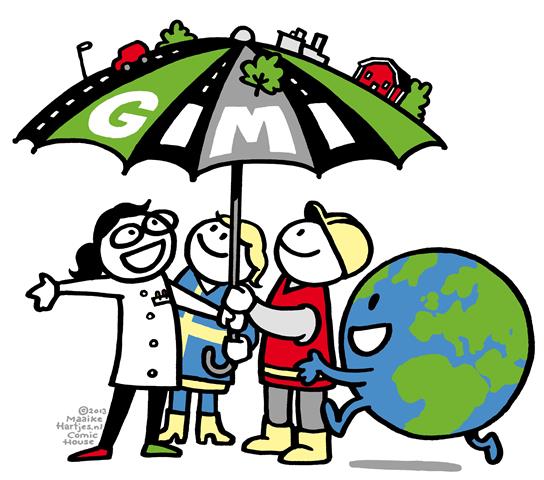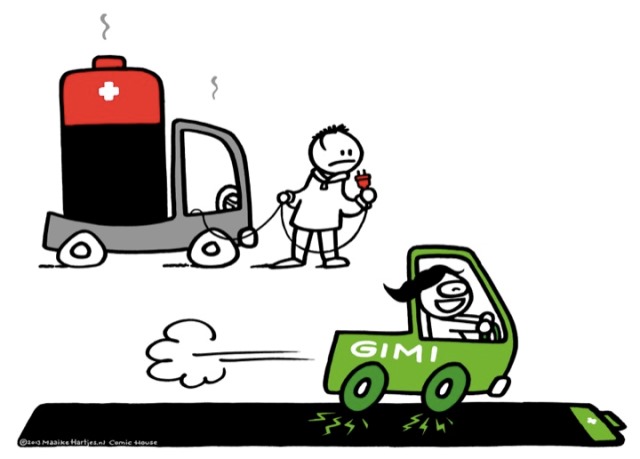About GIMI Agenda
The GIMI Agenda (Green Infrastructure Material Innovations) has been developed for a National Swedish Strategic Research and Innovation Environment. Road2Science has coordinated the development of the GIMI Agenda in collaboration with all its stakeholders. It is a roadmap taking us from 2013 to 2030 and describes the research, education, transfer to industry and innovation steps in detail. The GIMI agenda has been published in a hardbound copy. If you want to receive your own copy, please contact Road2Science.

Summary of the GIMI environment
With 90 billion SEK in annual expenses to build and maintain the national infrastructure network consisting of asphalt, concrete and steel, and with 1.2 million truck loads being driven around to transport infrastructure material, Sweden has a tremendous potential to transform the traditional infrastructure sector into a green one . The importance of a sustainableand dependable infrastructure network goes far beyond these numbers alone. A thriving transport infrastructure network functions as the driving force for further economic growth and helps to attract international ventures, making it a national strategic asset. Given the current pace of inventions in high-tech materials, ICT solutions and environmentally friendly vehicles, it is of utmost importance that our transport infrastructure itself is not lacking behind in environmentally friendly innovations. For this, it must be able to implement the latest innovations into practice as well as to become a driving force in new technology developments. Traditionally based on minimizing risks, the infrastructure sector has never been keen on new technology. With future functionalities on the doorstep, now is the time to ensure that this sector will modernize, embrace and drive innovations in its sector.
For this reason, KTH, in collaboration with the Swedish industry, has proposed a National Strategic Research and Innovation Agenda on Green Infrastructure Material Innovations (GIMI). Stakeholders in the infrastructure sector will collaborate in a GIMI environment with a shared vision: Scientists to drive the knowledge, industry to apply the new technology, standard setting bodies to provide the supporting standards and policies and a strong (inter)national network to allow for dissemination, communication and cross-disciplinary interactions. Since GIMI is an ambitious agenda with many stakeholders, it is important that the environment is shaped in such a way that specific measurable in- and outputs can be defined. For this reason the Agenda is divided into 11 Strategic Sub-Environments (SSEs): the SSE-0 GIMI Communication, the SSE-1 GIMI Open Platform, the SSE-2 GIMI COOP Program, the SSE-3 GIMI Academy Industry Meeting Days, the SSE-4 GIMI Research Program, the SSE-5 GIMI Online Course Program, the SSE-6 GIMI Standardization, the SSE-7 GIMI Participatory Simulation Training, the SSE-8 GIMI Strategic Partnerships, the SSE-9 GIMI Demonstrations and the SSE-10 GIMI Dissemination & Exploitation. Each SSE has its own coordinator, selected on acknowledged technical and managerial expertise and extensive experience with respect to collaborative projects, its own Management Team and membership base. The GIMI Management Team coordinates the GIMI environment guided by two reference groups: the GIMI National Reference Group and the GIMI International Reference Group. These reference groups ensure that the GIMI environment is inclusive in its views, is aware of other national and international relevant activities, and suggests new activities or strategic membership(s). The overall financial resources required for the GIMI agenda are estimated at 28 MSEK in its first operational year (2013-2014), increase to 32 MSEK in its second year and continue to evolve as more activities are developed following the GIMI Road Map. After 20 years (in 2030), GIMI is estimated to be running without the need for external funding, since the self-generated revenues and partners contributions will match the costs associated with the GIMI agenda.
The GIMI vision is very ambitious, challenging and exciting. The societal impact that this agenda could have is reaching beyond optimization of a number of processes, tools or products. GIMI is about establishing a paradigm shift in Sweden’s infrastructure sector. At this moment in time, Sweden has the in-house expertise and infrastructure capacity to successfully create GIMInnovations, implement them into practise and make them into Swedish export products. As a nation, Sweden is small enough that the agenda can unite all its stakeholders into a common vision, and large and innovation-driven enough that its impact will be significant. The current constellation of the international transport infrastructure sector facilitates that if Sweden embraces the GIMI agenda today, we will become a frontrunning nation in Green Infrastructure Material Innovations tomorrow and, as such, have the opportunity to set the agenda globally.
Click here to donwload the GIMI Roadmap (pdf 4.1 MB)

